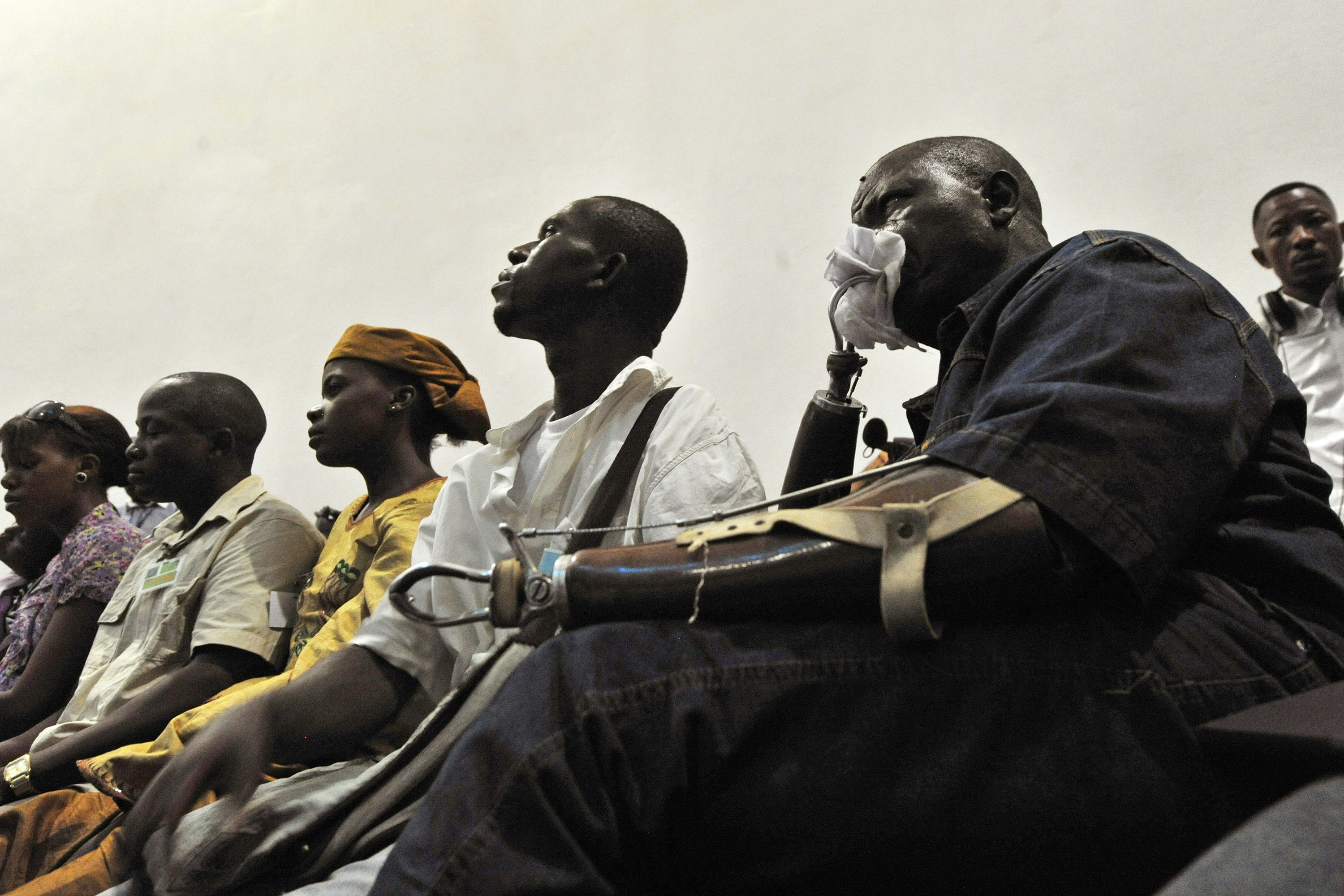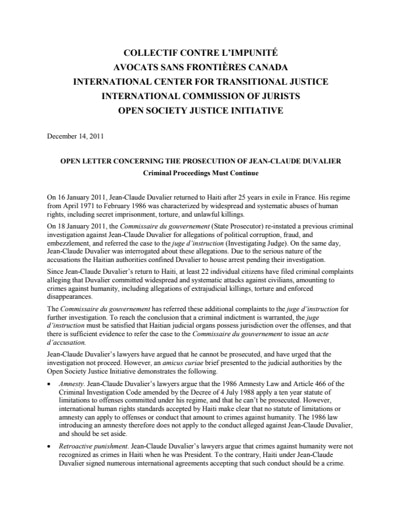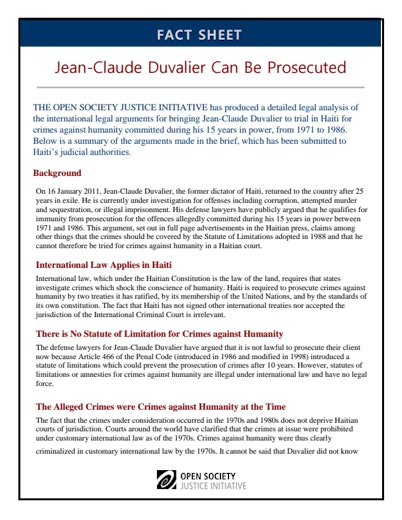Jean-Claude Duvalier
Former Haitian Dictator Evades Domestic Prosecution
In January 2011, former dictator Jean-Claude Duvalier returned to Haiti after 25 years in exile. His 15-year regime was characterized by widespread violations of human rights. He was placed under investigation for offenses including corruption, attempted murder and sequestration. Despite domestic and international calls to address the systematic violation of human rights committed during Duvalier’s rule, his defense lawyers publicly argued that he qualifies for immunity from prosecution, and that he could not be tried for crimes against humanity in a Haitian court.
Facts
On April 21, 1971, Jean-Claude “Baby Doc” Duvalier became the Haitian Head of State when his father, François “Papa Doc” Duvalier, died. Duvalier ruled Haiti for 15 years, during which extrajudicial killings, torture and disappearances of political dissidents were widespread across the country, and thousands of Haitians were forced into exile abroad. Under the direction of Duvalier, members of Haiti’s armed forces and paramilitary Volunteers for National Security, also known as the tonton macoutes, persecuted human rights activists and violently repressed pro-democracy movements. Duvalier was eventually deposed on February 7, 1986, and he spent the next 25 years in exile in France.
On January 16, 2011, Duvalier returned to Haiti. Shortly after his return the State Prosecutor re-instated a previous criminal investigation against him, and referred the case to an Investigating Magistrate. On the same day, Duvalier was interrogated on allegations of political corruption, fraud and embezzlement. Due to the serious nature of the accusations, Haitian authorities confined Duvalier to house arrest pending their investigation.
Since Duvalier’s return to Haiti, at least 16 individual citizens filed criminal complaints in their name or on behalf of victims of crimes committed by Duvalier. The complaints alleged, inter alia, that the crimes Duvalier committed throughout his presidency constituted a widespread and systematic attack against civilians, amounting to crimes against humanity. The complaints included allegations of extrajudicial killings, torture and enforced disappearances. The State Prosecutor referred these complaints to the Investigating Magistrate for further investigation.
Duvalier’s lawyers argued that he should not be prosecuted because the crimes at issue were not recognized offenses at the time Duvalier was alleged to have committed them, do not constitute crimes under Haitian law, and were barred by the statute of limitations in Haiti’s Penal Code.
Open Society Justice Initiative Involvement
The Justice Initiative prepared and publicized written comments on the relevant international standards that apply in Haiti, to assist judicial authorities investigating the case against Duvalier making the following arguments.
Arguments
Constitutional Application of International Standards in Haiti. The Haitian Constitution makes clear that human rights standards and international law accepted by Haiti are the law of the land. This establishes crimes against humanity as criminal offenses, and imposes a duty to investigate and prosecute both their intellectual and material authors.
No Statute of Limitations or Amnesties for Crimes against Humanity. Crimes against humanity have been recognized as criminal offenses since Nuremberg. The behavior alleged against Duvalier was obviously criminal. Under international human rights standards accepted by Haiti no statute of limitations or amnesty can apply to such crimes. The 1986 Amnesty Law therefore does not apply to these offenses and should be set aside.
Criminal Offenses under Haitian Law. The allegations against Duvalier can be prosecuted under domestic law and characterized as crimes against humanity with no need for further legislation.
Duvalier dies of a heart-attack at the age of 63.
The Justice Initiative submits written comments to judicial authorities in Haiti.
Jean-Claude Duvalier returns to Haiti after 25 years in exile. Authorities re-instate domestic proceedings against Duvalier and refer his case, along with 16 criminal complaints, to the Investigating Magistrate.
Haitian authorities open a criminal investigation into alleged crimes against persons committed during Jean-Claude Duvalier’s presidency, including crimes against humanity.
New Haitian government extends the statute of limitations for crimes committed under the Duvalier regime (including murder, false arrest, and illegal imprisonment) until June 1996, and establishes a commission to investigate Jean-Claude Duvalier’s financial crimes.
Following protests throughout Haiti and a popular uprising against the government, Jean-Claude Duvalier resigns and goes into exile in France.
François Duvalier dies and his son, Jean-Claude Duvalier, becomes President.
Rigged constitutional referendum makes François Duvalier “President for Life.”
François Duvalier is elected President of Haiti.
Related Cases
Related Work
How International Justice Can Go Local
Over 30 national and regional initiatives have been launched to prosecute mass atrocity crimes since the early 1990s. A comprehensive new survey looks at the lessons learned.

Joint Letter: Criminal Proceedings Against Jean-Claude Duvalier Should Continue
Five international and Haitian legal rights groups are urging the Haitian judicial authorities to press criminal charges against the country's former dictator.

Fact Sheet: Jean-Claude Duvalier Can Be Prosecuted
A two-page fact sheet summarizes a longer legal brief submitted to the judicial authorities in Haiti, arguing that the former Haitian dictator should face trial.
